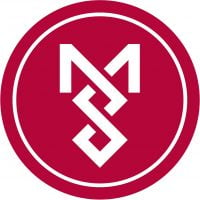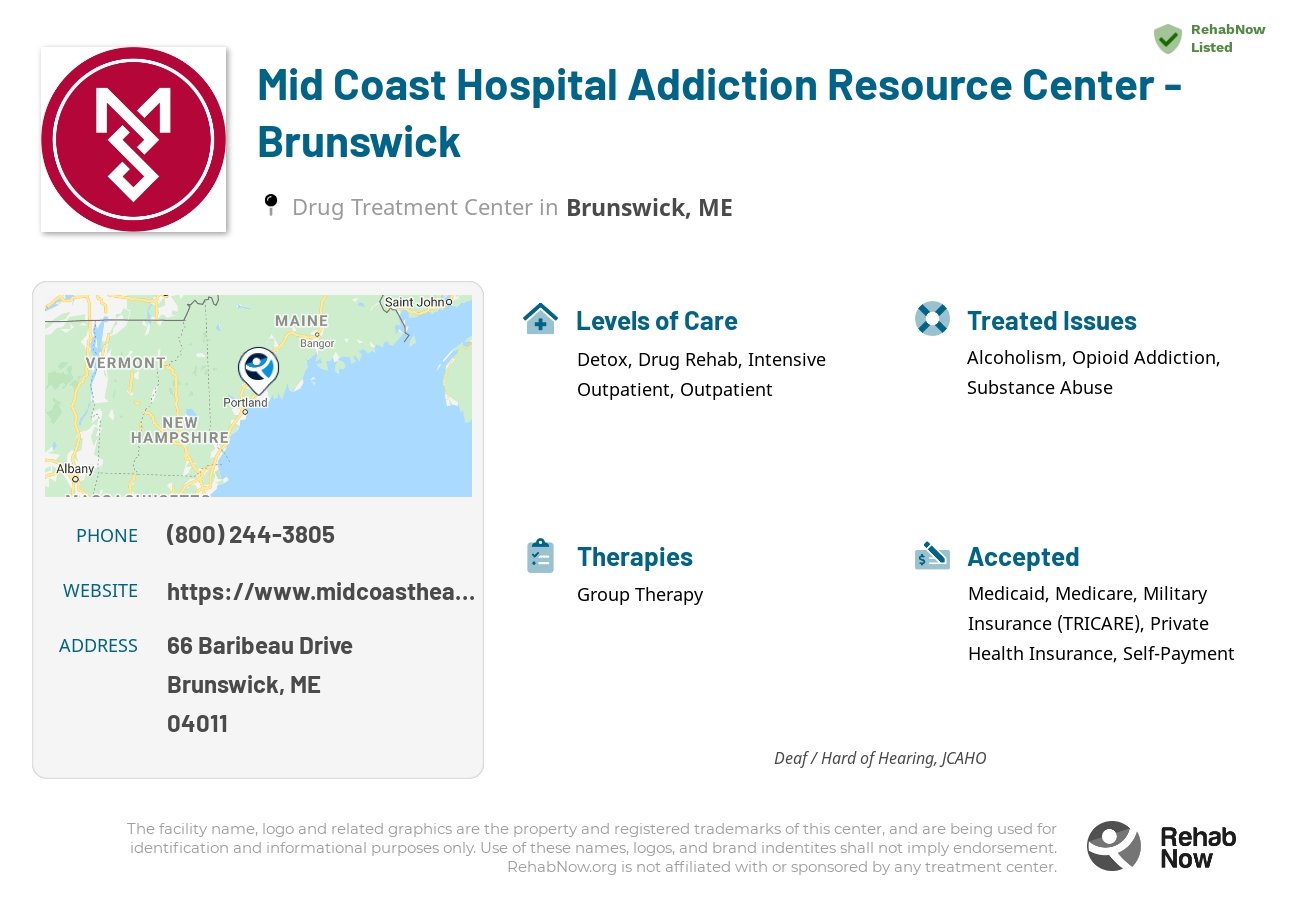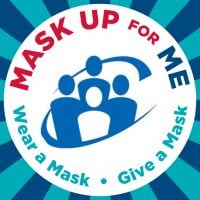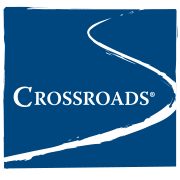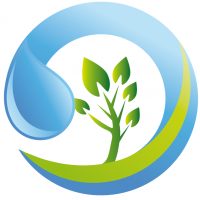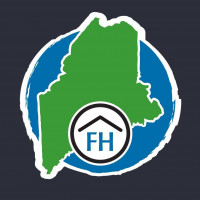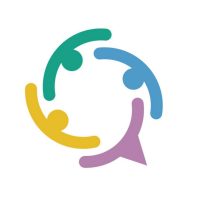Mid Coast Hospital Addiction Resource Center - Brunswick
Drug Rehab Center in Brunswick, Maine
The Mid Coast Hospital Addiction Resource Center - Brunswick is a comprehensive and accredited facility in Maine offering multiple levels of care for individuals struggling with alcohol, opioids, substance abuse and other drug-related issues, ranging from detox to aftercare support programs tailored to suit each person's unique needs.
About This Maine Facility
The Mid Coast Hospital Addiction Resource Center (ARC) in Brunswick, Maine is recognized nationally for offering high-quality, confidential treatment for those struggling with drug and alcohol addiction. This facility stands out because of its integrated healthcare approach, facilitated by Mid Coast Hospital's comprehensive resources, ensuring coordinated care for patients. It’s characterized by its welcoming atmosphere—no appointment is necessary, and every individual's need for help is met with open arms and without judgment.
- Integrated with Mid Coast Hospital’s Resources: Ensures a comprehensive and coordinated approach to addiction treatment and recovery.
- Caring and Compassionate Staff: Available around the clock, providing a warm and supportive environment for those seeking help.
- Accepts Walk-ins and Guarantees Confidentiality: Emphasizing ease of access and the privacy of every individual undergoing treatment.
Accredited by the Joint Commission and licensed by the Maine State Office of Substance Abuse, the Addiction Resource Center sets a high standard for healthcare quality and safety in addiction treatment. The ARC’s commitment to excellence is further underscored by its array of services tailored to meet the specific needs of individuals battling addiction and related mental health issues.
The ARC specializes in treating a wide variety of addictions, including alcohol and drug use, with a particular focus on maintaining confidentiality and providing treatment regardless of a person's financial situation. Treatment methods range from medical detoxification to residential and outpatient programs, individual counseling, and family therapy, ensuring comprehensive care tailored to each patient's needs.
Genders
Ages
Modality
Additional
Accreditations

JCAHO
Conditions and Issues Treated
A drug abuser needs help because if no one helps them, they will not leave their vicious circle.
People who abuse drugs are likely to suffer from an addiction, which can cause serious health problems. It can also cause quarrels with people around them. It is common for drug abusers to have difficulty holding down jobs or relationships, but sometimes people around them can be quite tolerant. There are cases where the families of the drug abusers do not want to see them get any help, and the subject becomes controversial.
When it comes to helping drug abusers get sober, there are many options to choose from. It is essential to state that there is no “correct” way of doing things. People are different, and they need different types of help to get over their addiction.
Opioid addiction treatment should be done in a medically supervised drug rehab. Opioid addiction treatment will include detoxification and drug rehab counseling to help both the user and their loved ones learn how to live a successful sober lifestyle. Methadone, buprenorphine, and naltrexone are three medications that can help treat opioid addiction. Individual drug rehab counseling sessions can be helpful to discuss any questions or concerns with the drug treatment program.
Levels of Care Offered at Mid Coast Hospital Addiction Resource Center - Brunswick
This center offers a variety of custom treatment tailored to individual recovery. Currently available are Aftercare Support, Detox, Drug Rehab, Intensive Outpatient, Outpatient, Partial-Hospitalization, with additional therapies available as listed below.
Detoxification is the first step in drug addiction treatment. A controlled environment where symptoms can be managed with medication and close observation is provided by drug detoxification. Detoxification is an essential step in the recovery process, but it is also one of the most dangerous. Due to the potential danger, it’s critical to understand what detoxification is and how to complete it safely.
A detox program helps the person physically withdraw from drugs and helps them track their progress. So, suppose the person isn’t ready for sobriety (or relapses). In that case, the treatment professionals can catch it early and help re-orient them towards recovery.
The Intensive Outpatient Program at Mid Coast Hospital Addiction Resource Center - Brunswick is for those who need intensive care but would rather get it in the comfort of their own home. The treatment programs vary in duration and intensity and can be tailored to suit the individual’s needs. IOP helps the patient to live at home and gradually get back to their routine life.
Daily trips to the hospital that provides the treatment include intensive outpatient services (IOP). The patients gradually get back to their everyday lives. IOP benefits the most when the patients have a supportive family member or friend who can encourage them in their recovery.
Individuals struggling with drug addictions can get help from several treatment options, including inpatient and outpatient programs. Outpatient drug treatment programs can also provide patients with different levels of care, usually depending on the patient’s degree of addiction.
At an outpatient program in Brunswick, a patient will attend a recovery program during the day and return home in the evening. Suppose a patient is struggling with drug addiction. In that case, an outpatient program can serve as an effective transition point during the recovery process.
Partial Hospitalization Program is when a person in rehab takes part in regular treatment sessions, at least five days per week (and sometimes six), during all or most hours of the day, at Mid Coast Hospital Addiction Resource Center - Brunswick. These programs vary in length, but they can last anywhere from one month to three months—or longer.
This is done through the use of a method called “therapeutic community.” PHPs are very intense, and they are best for individuals who have completed a successful, medically supervised withdrawal.
Aftercare is a part of drug rehabilitation. It is also known as “post-treatment support.” Aftercare programs are available for addicts after they complete drug rehab. It is often the final step in the recovery process. The goal of aftercare is to ensure that addicts maintain their achievements in rehab and do not relapse. Professionals generally provide aftercare (including addiction therapists, physicians, social workers, psychologists) and involve individual and group therapy sessions.
Therapies & Programs
Individual therapy is a critical component of addiction recovery. It allows the patients to go deep into their core issues and discover how to handle those problems better. Therapy can be conducted in individual sessions as well as group settings. In individual therapy for addiction, the patient meets with their therapist one-on-one to focus on the underlying issues. This allows patients to open up and discuss personal topics they may not feel comfortable discussing in a group setting. This type of therapy can help develop solutions specific to each patient, which helps speed up the recovery process.
Family therapy is a crucial part of drug treatment and getting sober. It is one of the most effective ways to help addicts stay on the path to long-term sobriety. When a drug addict decides that they want to try and get sober, it takes the support of every person they love to succeed. It can be incredibly difficult for loved ones to watch an addict go through the pain and suffering of withdrawal, but by being there with them and supporting them, they can help to make sure that the addiction never returns.
One of the most important parts of family therapy is the relapse prevention plan. During treatment, therapists and doctors will often sit down with the addict and their family to develop a plan in case the addict ever feels like they want to use again. This plan should involve steps the addict and family can take together to prevent them from relapsing in the future. An addict’s family can play a vital part in helping them to avoid relapse because they can spot the warning signs and help them get back on track before it becomes too much of a problem.
Group therapy helps prevent addicts from feeling isolated or unique in their situation by offering a sense of comfort and fellowship. It also creates a forum for addicts to build their support systems and learn from each other. The group therapy sessions at Mid Coast Hospital Addiction Resource Center - Brunswick occur in a group setting rather than one-on-one to create a safer, controlled environment where addicts feel comfortable.
Trauma therapy helps people dealing with addiction by allowing them to confront the traumas of their past and move past them. It is important to note that trauma therapy should not be confused with PTSD (post-traumatic stress disorder) Rather, it is used to treat the effects of trauma, which are often at the root of addiction.
Dialectical Behavior Therapy was developed in the 1980s to treat chronically suicidal individuals. It is a cognitive-behavioral therapy that combines strategies derived from Zen Buddhism, such as mindfulness training. DBT has been adapted for use with other types of psychiatric problems, including substance abuse and personality disorders. DBT aims to help patients change their thinking and behavior, instead of relying on medication.
Cognitive Behavioral Therapy (CBT) is a common therapeutic approach to help drug addicts. It teaches addicts new ways of thinking and behaving so that they can avoid relapse. There are several forms of CBT used in drug rehabilitation centers.
Cognitive Restructuring helps addicts identify faulty, negative thinking so that they can work together with the therapist to find healthier ways of thinking, resulting in better decision-making.
Cognitive Behavioral Therapy for Addiction uses the principles of CBT to help treat addiction. It focuses on specific aspects of each person’s thinking, feeling, physiology, and behavior. It aims to identify specific problems in these areas and create a personalized treatment strategy.
Entering a 12-step program allows people to accept that they struggle with an addiction on their own terms. It breaks down the process into 12 steps and gives recovering patients the ability to self help themselves without feeling rushed.
In Alcoholics Anonymous, members follow “The Big Book,” which contains guidelines for sobriety and offers support from fellow participants who have been through similar struggles. Many drug users also turn to Narcotics Anonymous or Pills Anonymous when they are looking at seeking treatment.
Both Narcotics Anonymous and Alcoholics Anonymous have 12 steps in common. They address issues that include ‘admitting there is a problem,’ taking control of the addiction, learning to listen to others without judgment, making amends, and more.
Contingency Management (CM) is one of many forms of Cognitive Behavioral Therapy (CBT) It helps people get sober/clean by rewarding them for sobriety or just staying clean. Rewards can come in many forms, like getting paid $10-$15 per drug-free urine sample or even just getting extra points towards earning something as simple as extra phone privileges. Research has shown that when people are not given any reward system upon leaving treatment, they relapse more often.
Payment Options Accepted
For specific insurance or payment methods please contact us.
Is your insurance accepted?
Ask an expert, call (888) 674-0062
Mid Coast Hospital Addiction Resource Center Associated Centers
Discover treatment facilities under the same provider.
- Mid Coast Hospital Addiction Resource Center - Damariscotta in Damariscotta, ME
- Mid Coast Hospital Behavioral Health - Brunswick in Brunswick, ME
Learn More About Mid Coast Hospital Addiction Resource Center Centers
Additional Details
Specifics, location, and helpful extra information.
Brunswick, Maine 4011 Phone Number(800) 244-3805 Meta DetailsUpdated April 15, 2024
Staff Verified
Patient Reviews
There are no reviews yet. Be the first one to write one.
Brunswick, Maine Addiction Information
Prescription opioid abuse is the most common form of substance abuse in Maine. More than 10% of these residents have also admitted to using prescription drugs for non-medical purposes. Between 2013 and 2014, 4 out of every 5 deaths in Maine were caused by illicit drugs. One in five high school students in Maine uses marijuana every single month.
There are about 600 reported incidents of drug-related problems every year in Brunswick, Maine. 15% of people in Brunswick have a substance abuse problem at some point in their lifetime. The most abused drug in Brunswick is Oxycontin followed by hydrocodone and Valium. There are various drug treatment programs in Brunswick, Maine, treatment includes outpatient treatment and Inpatient treatment along with therapies and counseling.
Treatment in Nearby Cities
- Madawaska, ME (252.2 mi.)
- Mechanic Falls, ME (25.3 mi.)
- Kennebunk, ME (45.4 mi.)
- Mexico, ME (53.5 mi.)
- East Machias, ME (140.7 mi.)
Centers near Mid Coast Hospital Addiction Resource Center - Brunswick
The facility name, logo and brand are the property and registered trademarks of Mid Coast Hospital Addiction Resource Center - Brunswick, and are being used for identification and informational purposes only. Use of these names, logos and brands shall not imply endorsement. RehabNow.org is not affiliated with or sponsored by Mid Coast Hospital Addiction Resource Center - Brunswick.
